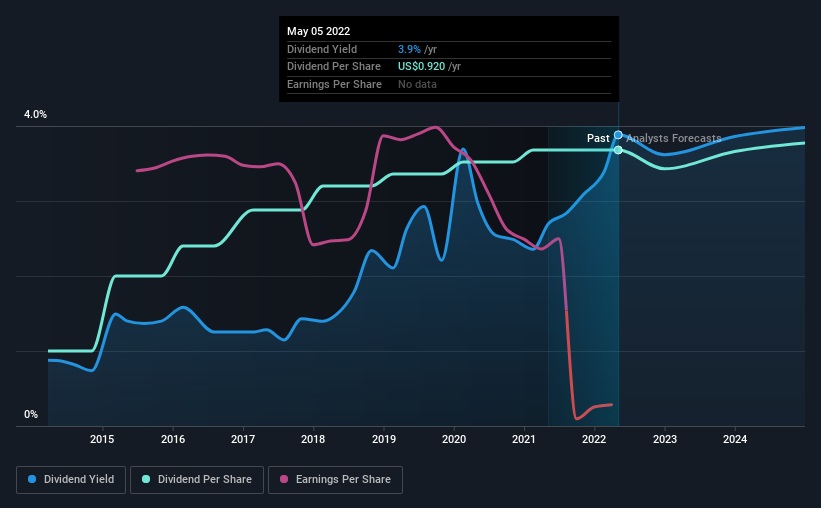Don't Race Out To Buy RE/MAX Holdings, Inc. (NYSE:RMAX) Just Because It's Going Ex-Dividend
RE/MAX Holdings, Inc. (NYSE:RMAX) stock is about to trade ex-dividend in 3 days. The ex-dividend date is one business day before a company's record date, which is the date on which the company determines which shareholders are entitled to receive a dividend. The ex-dividend date is of consequence because whenever a stock is bought or sold, the trade takes at least two business day to settle. In other words, investors can purchase RE/MAX Holdings' shares before the 10th of May in order to be eligible for the dividend, which will be paid on the 25th of May.
The company's next dividend payment will be US$0.23 per share, and in the last 12 months, the company paid a total of US$0.92 per share. Based on the last year's worth of payments, RE/MAX Holdings stock has a trailing yield of around 3.9% on the current share price of $23.7. If you buy this business for its dividend, you should have an idea of whether RE/MAX Holdings's dividend is reliable and sustainable. So we need to check whether the dividend payments are covered, and if earnings are growing.
See our latest analysis for RE/MAX Holdings
Dividends are typically paid out of company income, so if a company pays out more than it earned, its dividend is usually at a higher risk of being cut. RE/MAX Holdings's dividend is not well covered by earnings, as the company lost money last year. This is not a sustainable state of affairs, so it would be worth investigating if earnings are expected to recover. Considering the lack of profitability, we also need to check if the company generated enough cash flow to cover the dividend payment. If cash earnings don't cover the dividend, the company would have to pay dividends out of cash in the bank, or by borrowing money, neither of which is long-term sustainable. Over the last year, it paid out more than three-quarters (75%) of its free cash flow generated, which is fairly high and may be starting to limit reinvestment in the business.
Click here to see the company's payout ratio, plus analyst estimates of its future dividends.
Have Earnings And Dividends Been Growing?
Businesses with shrinking earnings are tricky from a dividend perspective. If business enters a downturn and the dividend is cut, the company could see its value fall precipitously. RE/MAX Holdings was unprofitable last year and, unfortunately, the general trend suggests its earnings have been in decline over the last five years, making us wonder if the dividend is sustainable at all.
The main way most investors will assess a company's dividend prospects is by checking the historical rate of dividend growth. RE/MAX Holdings has delivered 18% dividend growth per year on average over the past eight years.
We update our analysis on RE/MAX Holdings every 24 hours, so you can always get the latest insights on its financial health, here.
Final Takeaway
Is RE/MAX Holdings worth buying for its dividend? We're a bit uncomfortable with it paying a dividend while being loss-making. However, we note that the dividend was covered by cash flow. It's not the most attractive proposition from a dividend perspective, and we'd probably give this one a miss for now.
So if you're still interested in RE/MAX Holdings despite it's poor dividend qualities, you should be well informed on some of the risks facing this stock. For example, we've found 4 warning signs for RE/MAX Holdings (2 shouldn't be ignored!) that deserve your attention before investing in the shares.
Generally, we wouldn't recommend just buying the first dividend stock you see. Here's a curated list of interesting stocks that are strong dividend payers.
Have feedback on this article? Concerned about the content? Get in touch with us directly. Alternatively, email editorial-team (at) simplywallst.com.
This article by Simply Wall St is general in nature. We provide commentary based on historical data and analyst forecasts only using an unbiased methodology and our articles are not intended to be financial advice. It does not constitute a recommendation to buy or sell any stock, and does not take account of your objectives, or your financial situation. We aim to bring you long-term focused analysis driven by fundamental data. Note that our analysis may not factor in the latest price-sensitive company announcements or qualitative material. Simply Wall St has no position in any stocks mentioned.

